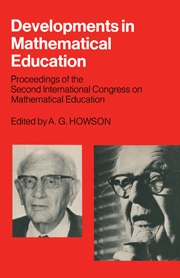 Developments in Mathematical Education
Developments in Mathematical Education Book contents
- Frontmatter
- Contents
- Editor's Acknowledgements
- PART I A CONGRESS SURVEY
- PART II THE INVITED PAPERS
- PART III A SELECTION OF CONGRESS PAPERS
- Investigation and problem-solving in mathematical education
- Intuition, structure and heuristic methods in the teaching of mathematics
- Mathematics and science in the secondary school
- Geometry as a gateway to mathematics
- The International Baccalaureate
- The role of axioms in contemporary mathematics and in mathematical education
- Implications of the work of Piaget in the training of students to teach primary mathematics
- Are we off the track in teaching mathematical concepts?
- Appendices
- Index
Mathematics and science in the secondary school
from PART III - A SELECTION OF CONGRESS PAPERS
- Frontmatter
- Contents
- Editor's Acknowledgements
- PART I A CONGRESS SURVEY
- PART II THE INVITED PAPERS
- PART III A SELECTION OF CONGRESS PAPERS
- Investigation and problem-solving in mathematical education
- Intuition, structure and heuristic methods in the teaching of mathematics
- Mathematics and science in the secondary school
- Geometry as a gateway to mathematics
- The International Baccalaureate
- The role of axioms in contemporary mathematics and in mathematical education
- Implications of the work of Piaget in the training of students to teach primary mathematics
- Are we off the track in teaching mathematical concepts?
- Appendices
- Index
Summary
Three questions which the work described in this paper seeks to answer are the following:
(1) What mathematical skills are required in the new secondary school science courses?
(2) To what extent do courses in modern mathematics provide for the development of these skills?
(3) In what ways can the work of science and mathematics departments in schools be more closely linked to promote more effective learning of these skills?
With the end of the nineteen sixties and the coming to fruition in Britain and the USA of the first generation curriculum projects in science and mathematics, the mood of teachers in the schools in these countries has changed. With increasing confidence in their own new materials and methods of teaching, they are beginning to have the time and energy to look across subject boundaries and to consider the possibility of inter-subject cooperation. Phrases like ‘Integrated Studies’ and ‘Interdisciplinary Enquiry’ are appearing increasingly as ‘subjects’ on school timetables. The new emphasis on children's cooperative, rather than competitive, activities (project work, small group activities of all kinds) is being matched in some places by first attempts at cooperative ventures among teachers (team teaching and ‘integrated’ approaches to the curriculum). This new spirit also finds expression in many of the second generation curriculum projects (exemplified in Britain in the sciences by Nuffield Secondary Science, Nuffield Advanced Physical Science, and the Schools Council Integrated Science Project, and in mathematics by the Mathematics for the Majority Continuation Project) which all share the marked characteristic of an approach to the curriculum on a thematic rather than a traditional ‘subject’ basis.
- Type
- Chapter
- Information
- Developments in Mathematical EducationProceedings of the Second International Congress on Mathematical Education, pp. 233 - 240Publisher: Cambridge University PressPrint publication year: 1973
- 1
- Cited by


